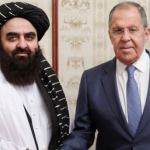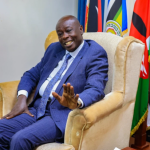Haitian Prime Minister Garry Conille embarked on a trip to the United Arab Emirates and Kenya on Saturday, seeking security assistance following one of the deadliest gang attacks in Haiti in recent years. The country is grappling with the aftermath of the Gran Grif gang’s rampage through the town of Pont-Sondé in the western Artibonite region, which left at least 70 people dead, including infants, and forced over 6,000 residents to flee.
The massacre has shocked even a nation accustomed to violence, highlighting the severe limitations of Haiti’s national police force, which is outgunned and understaffed. “As you can see, we are being attacked on several fronts,” Conille said during a press conference prior to his departure.
Just last week, the U.N. Security Council extended the mandate of an international security force intended to assist Haiti’s police in combating gangs and restoring law and order. However, progress has been slow, with only about 400 police officers, mostly from Kenya, currently on the ground.
Conille’s visit to Kenya is aimed at accelerating the deployment of additional Kenyan troops. “One of the aims of this trip is to go to Kenya to discuss with President Ruto how we can speed up the deployment of the remaining Kenyan troops as quickly as possible to continue supporting the national police force,” he said.
In the United Arab Emirates, Conille plans to engage with his counterparts to explore ways to secure regular financial flows to bolster Haiti’s national police in their fight against escalating insecurity.
On Friday, Conille, accompanied by heavily armed police, visited victims of the Pont-Sondé attack in a hospital, assuring them that reinforcements were being sent from Port-au-Prince. The Haitian national police confirmed later that evening that the director of police for the Artibonite department had been replaced.
The Gran Grif gang, which is the largest in the Artibonite region—an area critical for Haiti’s rice production—claimed responsibility for the attack. Gang leader Luckson Elan said the massacre was in retaliation for local civilians remaining passive while police and vigilante groups killed his gang members.
Last week, the U.N. Security Council extended the mandate of an international security force for another year, aiming to assist local police in combating gangs and restoring law and order in Haiti. However, the mission has seen limited progress so far, with only around 400 police officers, primarily from Kenya, on the ground.
Haitian Prime Minister Garry Conille highlighted the urgency of accelerating troop deployment during his trip to Kenya, saying, “One of the aims of this trip is to go to Kenya to discuss with President Ruto how we can speed up the deployment of the remaining Kenyan troops as quickly as possible to continue supporting the national police force.”
In the United Arab Emirates, Conille plans to hold talks with his counterpart to secure consistent financial support for Haiti’s national police as they face increasing security challenges.
On Friday, Conille, accompanied by heavily armed police, visited hospital patients injured in the recent attack in the Artibonite region and assured them that reinforcements were being sent from Port-au-Prince. That same evening, a spokesperson for Haiti’s national police told Reuters that the police director responsible for the Artibonite department had been replaced.
The Gran Grif gang, which dominates Haiti’s Artibonite region, is reportedly the largest in the area, which is home to many of the nation’s rice fields. Gang leader Luckson Elan claimed the recent deadly attack was retaliation against civilians who remained passive while police and vigilante groups killed his gang members.



